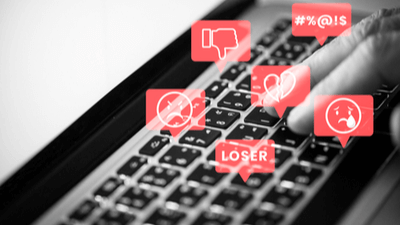How to Deal with Trolls

No matter what kind of media you consume or fandom you’re in, one thing stays constant: the presence of internet trolls. They’re a menace to everyone around them (except other trolls) and ruin the camaraderie and enjoyment of the media. You might wonder what makes them tick, why they do what they do, and what you can do to keep them from ruining your day.
Well then, you’ve come to the right article! I’ll be explaining what internet trolls are and what to do when encountering one.
Table of Contents
How to Identify an Internet Troll
On the surface, trolls are generally easy to spot. They’re rude, aggressive, and love stirring up drama or scandal. They feel that they are always right, even when there’s no evidence to back up their claims. You’ll see them goading emotional statements from others and reveling in them.
Many researchers have found some common traits they found among internet trolls. Earlier studies identified a ‘Dark Triad‘ of characteristics:
- Machiavellianism: the tendency to manipulate situations and words to gain power
- Narcissism: self-centeredness resulting in a lack of empathy for others and hypersensitivity to criticism
- Psychopathy: apathy and a lack of morality, making them prone to exploitative, manipulative, and dishonest behavior
These three traits make it easy for a person to hurt others. They might even do so gleefully, as their qualities say they’re always right and the other person deserves it. It gives them a rush of happy feelings, rewarding them for their behavior and perpetuating the cycle of hurt.
Further research figured out another factor that affects trolling behavior. It’s called Schadenfreude (pronounced shaa·duhn·froy·duh), the tendency to think other people’s suffering is funny. In German, that’s ‘harm’ and ‘joy’ put together.
By combining that with the Dark Triad characteristics, you get a person who would harm another and laugh at the victim’s misery.
Later, more researchers studied the phenomenon and added a new characteristic they found, making the triad a Dark Tetrad:
- Sadism: the enjoyment of causing or inflicting pain onto others
Now, having these traits doesn’t mean you instantly become an internet troll. These only prove the likelihood that you can become one. Everybody falls into the spectrum somewhere, but the closer you get to these traits, the higher the possibility of becoming a troll.
I’d like to add one last characteristic that can affect trolling. While I’m no psychologist (I did study it for college, but that’s all) or researcher, you can verify it yourself when observing toxic people.
- A deep sense of entitlement: “I deserve [a good thing] because I want it,” whether or not it actually is deserved
I see this most often in gaming communities, especially free-to-play games. If you’re an F2P player, who the hell are you to ask for better rewards like you deserve it? Why do you cry and whine that the paying players get all the cool stuff?
While it doesn’t seem malicious at first, it still hurts when someone doesn’t enjoy something you created. Imagine making something you love, pouring your time and effort into it, then someone comes along saying it’s trash. Then that person will say they like it if you give them a reward. In other words, it’s like they were holding their enjoyment of the creation hostage for a price.
It’s a threat, in the simplest sense. It should be ineffective as the developers have the right to do what they want with their game. They want people to enjoy the game, but there will be some detractors since they can’t absolutely please everybody. That’s normal.
What isn’t is players who actually enjoy the game giving a bad rating and demanding rewards just because the ones being offered were “too little.” That’s dishonesty, one of the identifying markers of trolls. There’s a more proper way to provide feedback and opinions. Why not use that?
Other examples are those who ask for free commissions from artists and insist on paying with “increased exposure.” Along with that, art stealers and re-posters are in this category. How would you feel when you create something beautiful only to get no compensation and have recognition go to the wrong person? The artist spent hours/days/weeks to make that, and these trolls trample on that effort.
Is it any wonder why artists and creators are overprotective? Why do many of them (maybe even more than you think) have low self-esteem? Remember the essential traits of trolls:
- Lacks empathy
- Thinks they’re always right despite evidence
- Likes hurting people and provoking them
- Thrives off suffering
They’re the perfect agent to instill negative emotions into others. When these feelings build up over time with no release, it bursts into a tragedy, and it’s not exclusive to creators. Anybody is susceptible to that.
What to Do When Encountering Trolls
Here’s what you can do to head off trolls or cut their enjoyment. Different methods work for different kinds of trolls, so pick what you’re comfortable with.
1. Do Not Engage
Ignoring a troll means they don’t get to see your reaction. Since they don’t see you getting angry, they don’t get the reward of an emotional response. You’ll have kept them from having their fun. Be strong because trolls are masters at the art of provocation. They know how to get under your skin to get the best results. This does not apply to art thieves, as those will continue the behavior if ignored.
2. Deflect With Humor
Internet trolls want you to be mad, not to howl with laughter. You can turn their comments into a joke if you’re the humorous type. The troll doesn’t get their preferred reaction and could give up. Take care to keep the jokes within tasteful bounds, as it’s easy to cross lines. That makes the joke loop back into being offensive that you might be the one accused of being a troll.
3. Be Patient and Kind
This could be the most challenging method to keep trolls at bay. It’s easier to give in to the impulse of reacting angrily. However, if you’re kind to them, you can connect with them and eventually settle down with a normal conversation. An unexpected response often trips them up because they’re used to responding to angry replies.
4. Calm Down Before Replying
Somewhat tied to the above method, you should first take deep breaths and calm down. You’ll be able to reply with something other than rage afterward. As mentioned above, anything other than anger can stop them in their tracks. They haven’t learned how to respond to a calm, measured response or anything other than anger.
5. Call Their Bluff
When arguing with a troll, their arguments are frequently illogical. Asking them for proof could stop them because there’s none. They just want to make noise and have an angry debate, but this method keeps them from having one.
6. Report Them, Block Them, and Set Privacy Settings to Cut Them Off
Most trolls live on social media sites. Blocking them, then setting your privacy options to be stricter about who can send you messages helps keep them at bay. Nothing’s stopping them from making another account, but it is simple to block that new account again. Reporting them might keep them from creating a new account, but it depends on the platform.
As for creators and artists, send a like, kudos, or some encouraging words on their work. It does mean something to them if you leave something that shows you appreciate the time and effort they spent on their creation. This includes all kinds of media, from videos and games to art and fanfiction.
Some of these methods might apply to gaming, but trolls in-game usually take the form of scammers aiming at your in-game gold or items. They’ll need a different set of methods, though usually, you can just ignore their offers of item/gold duplication or suspicious trade requests. Chat trolls can be handled in the same way.
Conclusions
Internet trolls are a part of daily internet life. We’ve all encountered one, whether first or second-hand. The anonymity and lack of severe consequences could make them so prolific on the internet. After all, most of their behaviors are unacceptable in real life. That doesn’t mean that they’re socially legal on the internet, either. It’s just harder to regulate people’s actions through a screen.
Take care not to accuse people of being a troll willy-nilly. Some might just be unintentionally offensive or misunderstood. If it becomes a pattern, that’s when you know they’re a troll. Understanding their mistake and apologizing is usually a sign that they were not being intentionally hurtful.
Trolls may no longer live under bridges (no WiFi, you see), but you’re now equipped and ready to face them. Have fun on the internet!















